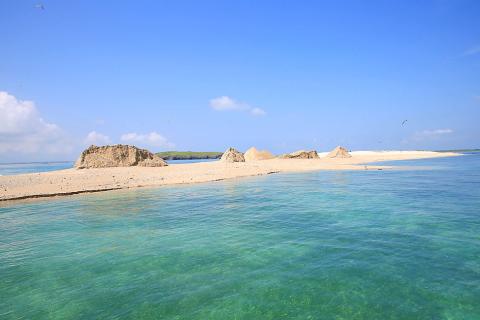Environmental protection groups protested against a dredging operation at Niaoyu Port (鳥嶼港) in Penghu County, saying the sand pulled from the harbor and piled on a clearing might be blown out to sea and damage coral reefs.
At least 35,000m3 of sand has been dredged up and deposited on the eastern part of Penghu Beach, in Niaoyu Park.
The sand deposit could harm local ecology, as terns nest on the beach in the summer, the groups said, adding that northeasterly monsoon winds in the winter could blow the sand back into the sea, which could cause an ecological disaster if the sand settles on coral reefs.

Photo provided by a reader
The area in question is a sandbank and not an intertidal zone, Penghu County Public Works Department Director Tsai Chi-hsien (蔡淇賢) said, adding that the department, along with the Department of Agriculture and Fisheries and the National Property Administration, decided that depositing the sand in the area would have minimal effects on local ecology.
Tsai said the sand deposit at Niaoyu Port might be caused by changes in local hydrology.
However, sources said that the local hydrology was not only changing at Niaoyu Port, adding that Jibei Islet (吉貝嶼) was also seeing a buildup of sand on its beaches after building breakwaters.
Artificial structures might be the primary cause of the hydrological changes, the sources said, adding that natural occurrences, such as typhoons, might also play a part.
The county government’s primary focus would be working toward the conservation of extant intertidal zones and ensuring the protection of marine ecology in the area, the sources said.

The manufacture of the remaining 28 M1A2T Abrams tanks Taiwan purchased from the US has recently been completed, and they are expected to be delivered within the next one to two months, a source said yesterday. The Ministry of National Defense is arranging cargo ships to transport the tanks to Taiwan as soon as possible, said the source, who is familiar with the matter. The estimated arrival time ranges from late this month to early next month, the source said. The 28 Abrams tanks make up the third and final batch of a total of 108 tanks, valued at about NT$40.5 billion

Two Taiwanese prosecutors were questioned by Chinese security personnel at their hotel during a trip to China’s Henan Province this month, the Mainland Affairs Council (MAC) said yesterday. The officers had personal information on the prosecutors, including “when they were assigned to their posts, their work locations and job titles,” MAC Deputy Minister and spokesman Liang Wen-chieh (梁文傑) said. On top of asking about their agencies and positions, the officers also questioned the prosecutors about the Cross-Strait Joint Crime-Fighting and Judicial Mutual Assistance Agreement, a pact that serves as the framework for Taiwan-China cooperation on combating crime and providing judicial assistance, Liang

A group from the Taiwanese Designers in Australia association yesterday represented Taiwan at the Midsumma Pride March in Melbourne. The march, held in the St. Kilda suburb, is the city’s largest LGBTQIA+ parade and the flagship event of the annual Midsumma Festival. It attracted more than 45,000 spectators who supported the 400 groups and 10,000 marchers that participated this year, the association said. Taiwanese Designers said they organized a team to march for Taiwan this year, joining politicians, government agencies, professionals and community organizations in showing support for LGBTQIA+ people and diverse communities. As the first country in Asia to legalize same-sex

MOTIVES QUESTIONED The PLA considers Xi’s policies toward Taiwan to be driven by personal considerations rather than military assessment, the Epoch Times reports Chinese President Xi Jinping’s (習近平) latest purge of the Chinese People’s Liberation Army (PLA) leadership might have been prompted by the military’s opposition to plans of invading Taiwan, the Epoch Times said. The Chinese military opposes waging war against Taiwan by a large consensus, putting it at odds with Xi’s vision, the Falun Gong-affiliated daily said in a report on Thursday, citing anonymous sources with insight into the PLA’s inner workings. The opposition is not the opinion of a few generals, but a widely shared view among the PLA cadre, the Epoch Times cited them as saying. “Chinese forces know full well that